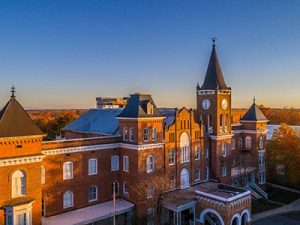Converse University receives $10K Collegiate Recycling Grant from DHEC
April 13, 2023Converse University recently received a $10,000 Collegiate Recycling Grant from the South Carolina Department of Health and Environmental Control (DHEC) to expand upon its existing recycling and sustainability programs.
The Collegiate Recycling Grant is a competitive grant program that allocates grant funds to colleges and universities for projects that promote sustainability through recycling, reuse, composting, and waste reduction. Funds received will contribute to projects including, but not limited to green cleaning, recycling, composting, and responsible food options, plus educational programming and professional development to further engage the Converse community in recycling and sustainability efforts.
“A key pillar of Converse University’s strategic vision is to support tomorrow’s growth in a way that is accessible, adaptable and sustainable,” said Vice President for Operations and Strategic Planning Kristin Lacey. “Converse values the multiplying effect of change when a community joins together, under a unified set of goals and priorities, to make a difference. This grant from DHEC will help us continue enhancing our ongoing recycling and sustainability initiatives on campus for a better Converse for generations to come.”
Grant funds will be used to bolster existing programs by standardizing recycling containers, redistributing their locations on campus based on traffic flows, and adding bins in higher traffic and event-based locations. The university also plans to expand its installation of efficient hydration stations in nearly every academic building on campus and in several residential facilities. These bottle-filling stations supplement traditional water fountains, saving money and reducing the use of plastic bottles and the fossil fuel used to produce and transport them.
Funds from the DHEC grant will also help empower student leaders, organizations and departments to take a more active role in understanding and expanding Converse’s efforts around sustainability. Converse looks to add more printed and digital signage on campus, and to be more intentional about updating the campus on its waste reduction efforts and impact while also increasing the presence of educational information on its website. The university will explore other opportunities to expand its reach deeper into the surrounding Spartanburg community, partnering with local companies in its efforts to reduce, reuse and recycle.
Programs already in place at Converse include recycling bins across campus dedicated to single-stream recycling; sustainable cleaning practices in collaboration with The Budd Group; and the diversion of more than 50,000 pounds of food waste each year via composting, in partnership with Atlas Organic. Three buildings on campus carry the LEED (Leadership in Energy and Environmental Design) designation on main campus: Kuhn Hall, Kate Hall, and Howard Hall.
Sustainability also crosses into the classrooms through various academic studies and scholarly efforts at Converse University. From the Environmental Studies program to active faculty research to internship opportunities, Converse fosters an environment for its students and faculty to make a lasting impact which drives our city and region vibrantly forward.
About Converse University
Converse University empowers students to become transformative leaders who see clearly, decide wisely, and act justly. Converse was founded in 1889 by citizens of Spartanburg, SC, who aimed to create an educational experience for women, and in fall 2020 it welcomed its first undergraduate co-educational incoming class. The University encompasses the School of Humanities, Sciences, and Business; the School of the Arts; the School of Education and Graduate Studies; and the Converse College for Women. Converse students experience deep scholarship, transformative mentorship, experiential learning, and wonderful support for and belief in each other. Through this unique formula, Converse is a creator of opportunity for its students through a personalized education that also includes the professional and technical skills graduates need to be successful in their careers.














